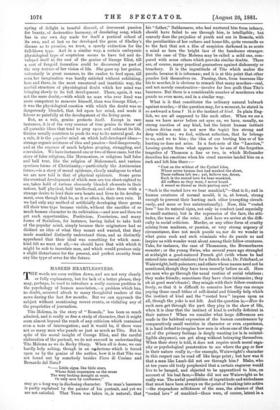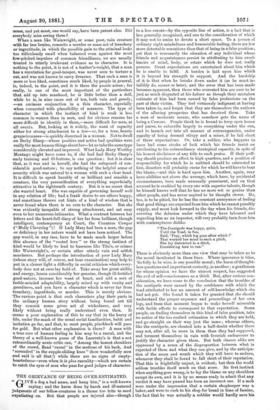MASKED HEARTLESSNESS.
THE words are soon written down, and are not very clearly or fully explanatory, but for lack of a better phrase, they may, perhaps, be used to introduce a really curious problem in the psychology of human association,—a problem which has, no doubt, occurred afresh to many thoughtful readers of the
news during the last few months. But we can approach the subject without mentioning recent events, or violating any of the proprieties of journalism.
Tito Melema, in the story of " Romola," has been so much admired, and is really so fine a study of character, that it might seem almost beyond the reach of any criticism which contained even a note of interrogation; and it would be, if there were
not so many men who puzzle us just as much as Tito. But in spite of the moral insight of George Eliot, and the careful elaboration of the portrait, we do not succeed in understanding Tito Melema as we do Becky Sharp. When all is done, we can hardly help asking, though in an undertone which is forced upon us by the genius of the author, how it is that Tito was not found out by somebody besides Piero di Cosimo and Bernardo del Nero P
"— Little signs, like little stars, Whose faint impression on the sense The very looking straight at mars, Or only seen by confluence,"
may go a long way in disclosing character. The man's baseness is partly explained by the painter of his portrait, and yet we are not satisfied. That Tessa was taken in,is natural; that his "father," Baldassarre, who had nurtured him from infancy, should have failed to see through him, is intelligible; but scarcely does the prejudice of youth and sex in Romola, with
the peculiarities of her culture and home-life, quite reconcile us to the fact that not a film of suspicion darkened in so acute a mind as hers the bright face of the handsome stranger. But the case of Tito Melema may be called a mild one, com- pared with some others which provoke similar doubts. There are, of course, many practical guarantees against dishonesty or treachery. It is the ingratitude of Tito which makes the puzzle, because it is inhuman ; and it is at this point that other puzzles link themselves on. Passing, then, from baseness like his to murder, it is obvious to remark that many murders—real, and not merely constructive—involve far less guilt than Tito's baseness. But there is a considerable number of murderers who puzzle us even more, and in a similar way.
What is it that constitutes the ordinary natural bulwark against murder,—if the question may, for a moment, be stated in
so awkward a form P It is the instinct of kind. In plain Eng- lish, we are all supposed to like each other. When we see a man we have never before set eyes on, we have, usually, no strong emotion of any kind, but the latent human instinct
(whose divine root is not now the topic) lies strong and deep within us ; we feel, without reflection, that he belongs to us, and we to him ; the idea of our hurting him or of his hurting us does not arise. In a foot-note of the " Laoc,00n," Leasing quotes from what appears to be one of the forgotten tragedies of Thomson a line or two, in which Melisander describes his emotions when his cruel enemies landed him on a rock and left him there :—
" Cast on the wildest of the Cycled Isles, Where never human foot had marked the ahem These ruffians left me; yet, believe me, Areas, Such is the rooted love we bear mankind, All ruffians as they were, I never heard A sound so dismal as their parting oars."
"Such is the rooted love we bear mankind,"—that is it ; and in human creatures of normal mould, it is, at lowest, strong enough to prevent their hurting each other (excepting circuit-
ously, and more or less unintentionally). Now, this "rooted love" has its natural signs, not only in conduct (and especially in small matters), but in the expression of the face, the atti- tudes, the tones of the voice. And here we arrive at the diffi- culty in social criticism. Murder, or any other form of• cruelty
arising from madness, or passion, or very strong urgency of circumstance, does not much puzzle us, nor do we wonder in what guise such and such criminals who do puzzle us and inspire us with wonder went about among their fellow-creatures. Take, for instance, the case of Thomassen, the Bremerhaven monster ; or the young Swiss, who several years ago strangled at midnight a good-natured French girl (with whom he had entered into casual relations) for a Dutch clock; Dr. Pritchard, or Wainwright, both poisoners; and others whose names need not be mentioned, though they have been recently before us all. Here are men who go through the usual routine of social relations ; they make friends ; sometimes they have close intimacies ; they sit at good men's feasts"; they mingle with their fellow-creatures freely, so that it is difficult to conceive how they can escape paying those small tithes of self-denial and friendly help which the instinct of kind and the "rooted love" impose upon us
all, though the yoke is not felt. And the question is,—How do such men get through the part they play in the show of life, when it is clear that the instinct of kind is awfully deficient in their nature P When we consider what large differences are made in the habitual expression of the human countenance by comparatively small varieties in character or even experience, it is hard indeed to imagine how men in whom one of the strong- est of the primary feelings is deeply wanting (or is in unintel- ligible abeyance), can get along without betraying themselves.
When their story is told, it does not require much moral saga- city or psychological penetration to see where the gap or flaw in their nature really is,—for example, Wainwright's character in this respect can be read off like large print ; but how was it that a man like Lamb did not see through him P Blake, who at ten years old truly prophesied that a certain engraver would live to be hanged, and objected to be apprenticed to him, on account of his bad face,—Blake did not see Wainwright as he really was. The awful possibilities of ingratitude and wickedness that must have been always on the point of breaking into action
—the stupendous selfishness of the man, the absence of that "rooted love" of mankind—these were, of course, latent in a
sense, and yet must, one would say, have been patent also. Did everybody miss seeing them ?
When a man like Wainwright, or some poor, vain creature with far less brains, commits a murder or some act of treachery or ingratitude, in which the possible gain to the criminal looks too ridiculously small when balanced even against the most low-pitched impulses of common friendliness, we are usually treated to utterly irrelevant evidence as to character. It is nothing to the point, it is not of a feather's-weight, that a man has a reputation for good-temper, was never seen to torture a cat, and was not known to carry firearms. That such a man is more or less liked, sometimes much liked, by people in general, is, indeed, to the point, and it is there the puzzle arises ; for meally, in one of the most important of the particulars -that add up into manhood, he is little better than a doll, while he is, in nine cases out of ten, both vain and greedy, —an ominous conjunction in a thin character, especially when connected with plausibility of manners. The type of -character in which the instinct of kind is weak is less -common in women than in men, and for obvious reasons far more difficult to identify in them,—more difficult for men, at all events. But, looking at it widely, the want of capacity either for strong attachment to a few—or, for a true, hearty gregariousness—is quickly discerned in a woman. Not to dwell -on Becky Sharp—whose positive and active bad qualities were -really the most human things about her—let us take the same type .considerably elevated and improved. What Lady Mary Wortley Montagu might have come to, if she had had Becky Sharp's -early training and ill-fortune, is one question ; but it is clear that, as it was and in herself, she had the safeguard of con- siderable good-nature ; to say nothing of the helpful sense of security which was natural to a woman with such a clear head. It is difficult to speak harshly of so brilliant and sensible a -creature, the very personification of everything superficially -attractive in the eighteenth century. But it is no secret that she wanted heart. She was capable of governing herself well in any relation of life; had a frank desire to see others happy, -and sometimes throws out hints of a kind of wisdom that is never found when there is no core to the character. But she --was evidently incapable of strong attachment, and sat easy even to her numerous intimacies. What a contrast between her letters and, the heart-full diary of her far from brilliant, though intelligent, contemporary at Court, the Countess Cowper ("Molly Clavering ") ! If Lady Mary had been a man, the gap -or deficiency in her nature would not have been noticed. The gap would, in any ease, have to be made much larger before -this absence of the "rooted love" or the strong instinct of :kind would be likely to lead to baseness like Tito's, or crimes like Wainwright's, or certain other utterly vain and selfish 'murderers. But perhaps the introduction of poor Lady Mary ,(whose story will, of course, not bear examination) may help to put in a clearer light a difficulty in social criticism which every- body does not at once lay hold of. Take away her great ability and energy, lessen considerably her genuine, though ill-fortified good-nature, increase her want of heart, and add a sort of -feeble-minded adaptability, largely mixed up with vanity and greediness, and you have a character which is never far from treachery, ingratitude, or murder. This is merely obvious. 'The curious point is that such characters play their parts in -the ordinary human story without being found out till -they commit some gross act of wickedness, and very likely without being really understood even then. It seems a poor explanation of this to say that in the hurry of life, under the mask of the usual social familiarities, habit and imitation go far, and that, to most people, pinchbeck will pass for gold. But what other explanation is there ? A man with a true core of human feeling in him may be a rascal, and the theory of a well-known poem of the Laureate's is that a not extraordinarily acute critic can, "Among the honest shoulders of the crowd, Read ' rascal ' in the motions of his back, And 4 scoundrel ' in the supple-sliding knee" (how wonderfully seen and said is all that !) while there are no signs of empty- heartedness—even when it is plus rascality—which are certain to catch the eyes of men who pass for good judges of character.































 Previous page
Previous page